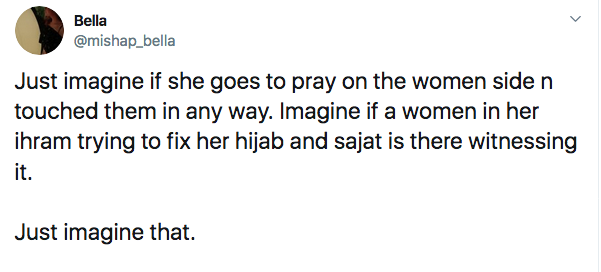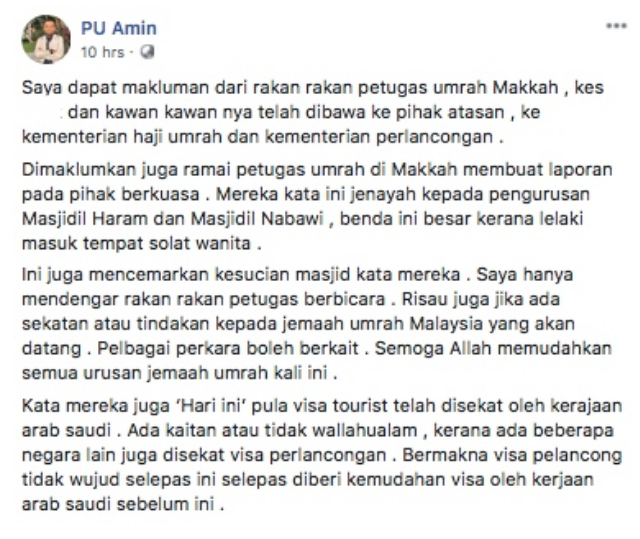Happy Monday, readers. Just in case you’re out there wondering why the obscure hashtag #Sajat seems to have overtaken 2020’s hottest pandemic #coronavirus over on Twitterjaya (or Twitterville, to the non-Bahasa speakers), wonder no more — we’re here with the explainer.
Buckle up, and grab a packet of wet wipes, because this is going to get messy.
First things first: Meet Nur Sajat, a local cosmetics entrepreneur and unabashed online attention-seeker. You might remember her in connection with a Suria KLCC bust-up involving her personal assistant and a shop worker? No?
OK, maybe you remember the time that Malaysia’s Islamic Affairs office JAKIM spent an inordinate amount of time investigating whether or not she was born a man. Ringing any bells yet?
The long and short of it seems to conclude that despite dozens of blue-faced denials over whether or not she is transgender, speculation continues to swirl as to whether Nur was a different gender at birth than the one she currently lives as.
Is it our business? No. Do we really care? Also, no.
Do we admire her ability to leverage this notoriety to sell more of her products? Is the pope Catholic? (Very much so.)
Now, Nur once again found herself trending on Twitter over the weekend after she shared a few video clips from a recent trip to Mecca where she performed Umrah, and did so as a woman.
She made sure to chronicle the pilgrimmage on social media, because what’s the point of doing anything if your millions of followers don’t know about it?
Real, bukan edit pic.twitter.com/nC8SbmxlxA
— keem (@AkeemSharyzal) February 2, 2020
Ooo-ee, did social media explode, with the holier-than-thou squaring up against the Twitter progressives with the kind of intensity you’d expect on a Super Bowl Sunday. As with all exasperating social media debates, no one won.
What is Umrah, you might be asking, and why do people care about how or whether Sajat did it? Umrah is an Islamic pilgrimage to Mecca that can be done at any time of year, unlike the Hajj, which must correspond to certain dates as per the Islamic lunar calendar.
As with the Hajj, Umrah requires that Muslims assume Ihram, a state of purification, complete with cleansing rituals, wearing specific attire, and abstaining from certain actions.
Still with us? Right. Now, some folks out there believe that by dressing as her identifying gender, Nur was behaving in a haram (unholy) manner, and flocked to social media to tell everyone all about it.
But while some were left grabbing for the smelling salts over Nur’s decision to perform Umrah as a woman, others had more nuanced thoughts on the matter.



One popular preacher even took to his Facebook account to weigh in, noting that while God accepts all, he had some issues with Nur’s decision:

“We must try to perform the Umrah and Allah accepts everyone, but we must protect the rules concerning aurat… if not, we can confuse the faith of other Muslims. He should have dressed up as a man to protect the sanctity of Mecca.”
Others, however, were understandably asking who appointed netizens the gatekeepers to holiness.



As for Nur, well – never one to shy away from controversy, she gave her two cents on her recent pilgrimage, noting that the experience was important for her spiritually, and gave her some time to ask God about the haters.
“I was really humbled by the whole experience, and saw how beautiful Islam is. It’s clear when you’re here, we’re all equal. We pray to the one God, Allah.”
She added that the experience gave her an opportunity to converse with God about the way she is.
“When I arrived here, I had the intention to converse with God concerning my existence. Why was I born this way? Why did Allah choose me to become like this? Why do I get a lot of tests? Why do people say I am cursed and won’t go to Heaven?”
Nur, just remember — there are only two certainties in life (neither of which is heaven): death and taxes. So don’t run afoul of the auditors down at the LHDN, and try not to worry about the rest.




